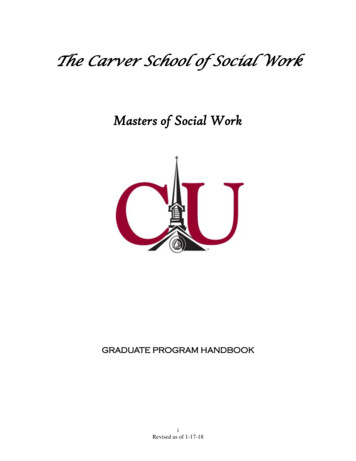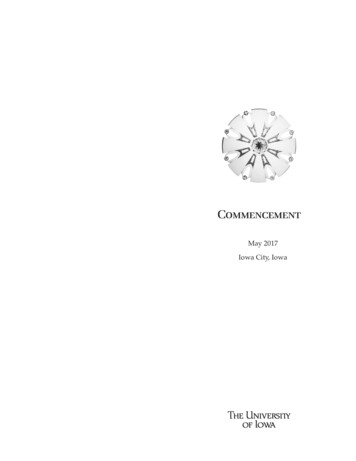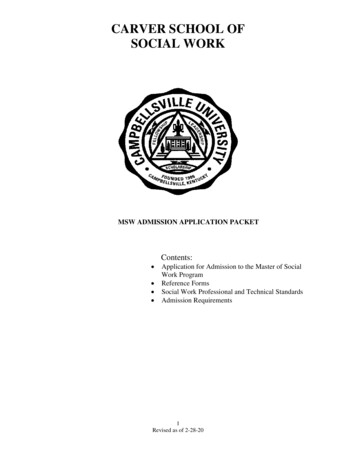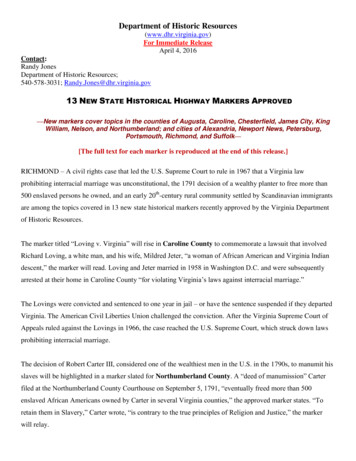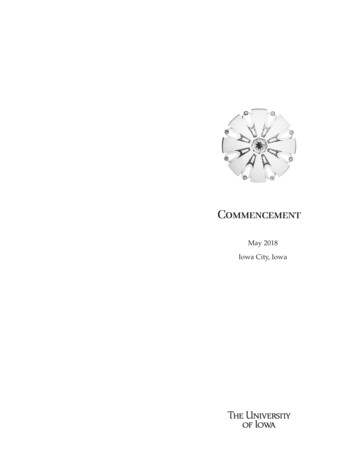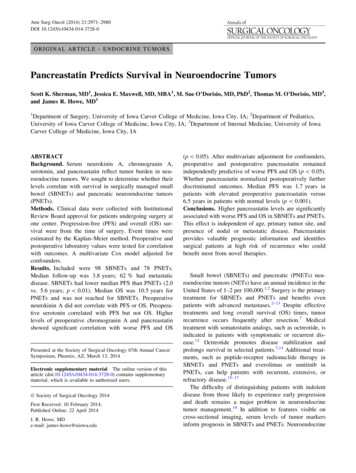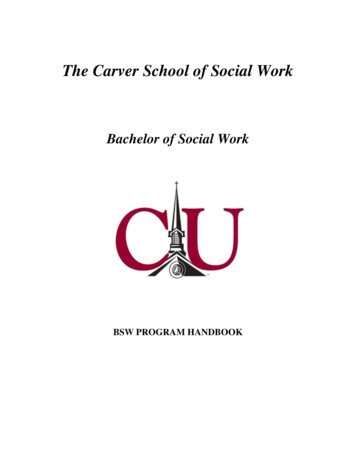
Transcription
The Carver School of Social WorkBachelor of Social Work2016-2017BSW PROGRAM HANDBOOK
Table of ContentsLetter of Welcome . .3Historical OverviewCampbellsville University .4Baccalaureate of Social Work Overview .6Social Work Program Mission, Goals and ObjectivesUniversity Mission Statement .9Baccalaureate Mission Statement .9Social Work Program Goals .10Social Work Program Competencies and Practice Behaviors .11Admissions Requirements for the Social Work ProgramEntrance Criteria .14Non-Academic Behavior .17Appeal of Non-Academic Behavior.18BSW Student Performance Review .18Transfer Credit .20Life Experience Credit .20Academic Policies and StandardsStudent Rights & Responsibilities .21Grade Point Average .22Course Policies.22Program Outcomes Assessment .26Field Learning Contract .26Exit Survey.27Alumni Survey .27Grievance & Appeals .28Advisee Information.29Baccalaureate of Social Work CurriculumProgram Content .30Course Sequence .30Social Work Minor (Non-BSW degree seeking) .33Online Course Sequence .35PCWCP Program .36Course Descriptions .37Social Work Clubs, Organizations, and AwardsSocial Work Club .47Advisory Board .48Phi Alpha .48Outstanding Social Work Award .49Servant Leader Award .491Revised as of 2-28-20
Overcomer Award .50Non-discrimination .51Campbellsville University Disability Statement .51Field Eligibility Information .52Social Work Faculty .54Appendices:A. NASW Code of Ethics .55B. Remediation Notification Form .94C. Rubric for Assessing Professional Development .96D. Incomplete Grade Agreement .100E. Application Process Check Sheet (BSW Program Application) .101F. Social Work Professional and Technical Standards .108G. Statements of Understanding .1102Revised as of 2-28-20
Congratulations on your acceptance into the social work program atCampbellsville University! We are pleased and excited about your interest insocial work as a profession and look forward to providing you with a generalistsocial work education. The faculty of the Carver School of Social Workwelcomes you.You are receiving this handbook to help acquaint you with the programpolicies of the baccalaureate social work program. It is important that youbecome familiar with this handbook, the University catalog and the Universitystudent handbook.If you have any questions about your educational pursuits, the social workfaculty will be pleased to assist you. We welcome your comments, ideas, andsuggestions regarding the social work program and this manual. We hope tomake your experiences with this program as educational and enjoyable aspossible. God bless you and thank you for your willingness to learn and serve.Sincerely,Dr. Anne AdcockAnne Adcock, DSW, MSW, CSWAssociate ProfessorBSW Program DirectorCarver School of Social Work3Revised as of 2-28-20
Historical OverviewCampbellsville UniversityCampbellsville University is a comprehensive co-educational institution located inCampbellsville, Kentucky. Affiliated with the Kentucky Baptist Convention, the Universitypromotes the liberal arts tradition, Christian values, and a quality education. CampbellsvilleUniversity views social work as a part of its responsibility and mission to the students, thecommunity, and society.The University is located in south central Kentucky. The population of Campbellsville isestimated to be about 11,266 Campbellsville is the county seat of Taylor County, which has apopulation of approximately 24,512.Campbellsville University was founded in 1906 by the Russell Creek Baptist Associationas the Russell Creek Academy. The Academy grew and expanded with the improvements bothin curriculum and facilities. In 1924, the institution was renamed Campbellsville College and in1933 joined the Kentucky Association of Colleges and Secondary Schools. In 1949, the Collegewas accredited by the Southern Association of Secondary Schools and Colleges as a juniorcollege. In December 1963, the College received membership in the Southern Association ofColleges and Schools as an accredited liberal arts college. In 1996, Campbellsville Collegeadvanced to University status. The University currently awards a variety of associate,baccalaureate, and master’s degrees.In the spring of 2010, the University had 128 full-time and approximately 183 part-timefaculty. Sixty-seven percent of the full-time faculty held terminal degrees in their disciplines.The Fall 2010 enrollment of approximately 3,431 students included individuals from 37 statesand 33 foreign countries. The student/faculty ratio in 2010 was 13/1.4Revised as of 7-24-2020
Campbellsville University is accredited by the Commission on Colleges of the SouthernAssociation of Colleges (1866 Southern Lane, Decatur, Georgia, telephone number 404-6794501) to award the associate’s, bachelors and master’s degrees. Campbellsville’s music programis accredited by the National Association of Schools of Music (NASM). The teacher preparationprogram is approved by the Kentucky Department of Education for teacher education andcertification. The Interstate Certification Project entitles the teachers graduated byCampbellsville and certified by Kentucky to be certified in other states.The university is a member of the American Council on Education (ACE), theAssociation of Independent Kentucky Colleges and Universities (AIKCU), the Association ofSouthern Baptist Colleges and Schools (ASBCS), the Coalition for Christian Colleges andUniversities (CCCU), the Cooperative Services International Education Consortium (CSIEC),the Council for the Advancement for Small Colleges (CASC), the Kentucky IndependentCollege Fund (KICF), the National Association of Independent Colleges and Universities(NAICU), and the Council on Social Work Education (CSWE).Campbellsville University is continually developing programs to help meet the needs ofthe Central Kentucky community. The social work club works to serve the community byhelping people and organizations fulfill unmet needs. Campbellsville University is noted for itscommunity outreach with music, art, drama, and religious education. Drama, musical concertsand noted speakers are offered to the community frequently at either minimal or no cost. TheCampbellsville community and surrounding counties have been very supportive of the universityand its mission.The University is supported financially by tuition, fees, and donations. The alumni,faculty, and staff of the University are also faithful financial contributors to the institution.5Revised as of 7-24-2020
Baccalaureate of Social Work OverviewCampbellsville University established its first program of social work in 1974. Theprogram was a Bachelor of Science degree offered with a social work major. The programexisted in this form until 1989 when it was phased out by the institution. In 1994, a social workprogram was re-instituted due to many requests from the community and the desire of theUniversity Board of Trustees. The University’s administration was insistent that if a programwere to be reestablished it must meet national standards established by the Council of SocialWork Education (CSWE). The Baccalaureate Social Work Program received officialaccreditation from CSWE in 2001. The degree conferred by Campbellsville University forpersons completing the degree requirements in the area of social work is a BSW.The BSW Program at CU views social work as a helping profession sanctioned by society toassist in the elimination of human suffering. Human societies are not perfect. Problems emergethat require solutions and human needs arise that must be met. Social work evolved from naturalhelping networks into a profession designed to systematically address social problems andhuman needs. In order to achieve this purpose, the profession takes two approaches: (1) Towork to change social institutions, organizations and communities to better meet the needs ofpeople and (2) To help people identify and utilize their own strengths and to connect them withthe resources which they lack. When resources are not available, social workers advocate andwork to establish programs to enhance the well being of humans and alleviate the sufferingbrought about by various psycho-social-behavioral issues.The generalist social work perspective of this BSW program is similar to the perspectives ofMiley, O’Melia, and DuBois (2004). Generalist social work draws upon common processes,specialized knowledge, communication, and intervention skills for the purposes of intervening6Revised as of 7-24-2020
on the behalf of people to create changes which maximize the functioning of systems. Socialwork occurs at all system levels with multiple compositions of systems (individuals, families,groups, communities, organizations). Guided by knowledge, skills, and abilities acquired from aliberal arts foundation and grounded in the core social work values of respect, empowerment andjustice, generalist social work is the ability to assess situations, define issues of concern, identifystrengths of current systems, develop strategies for intervention, match the levels of interventionto client needs and client systems (individual, families, groups, organizations, communities),implement courses of action, monitor change using research techniques, evaluate outcomes,terminate worker/client relationships and follow-up. Generalist social workers perform servicesthat inform and/or connect clients to available resources, intervene with organizations to enhancethe responsiveness of resource systems, advocate and develop just social policies to ensure theequitable distribution of resources, and research all aspects of social work practice.At Campbellsville University the social work area of education works to achieve all aspectsof generalist practice in preparing students to interpret various psycho-social-behavioral theoriesin the development of a knowledge base, interpret that base with assistance from instructors,critically analyze system needs and services in micro, mezzo and macro levels, and implementassistance and services using a solution focused format (assessment through termination).The BSW student has an opportunity to practice knowledge acquired in three practicecourses, a field seminar course, and numerous elective courses. During the practice and fieldcourses students apply their knowledge of generalist social work by using skills to define issues,collect and assess data, plan and contract for change, identify various interventions, implementcourses of action, monitor change using research techniques, evaluate outcomes, terminateworker/client relationships and follow-up.7Revised as of 7-24-2020
All coursework within the BSW Program is designed to educate students to performcompetent generalist social work practice. A Generalist education includes topics such asservices for the poor and oppressed, knowledge about populations of diverse origin andintervention methods with social systems of all sizes throughout the curriculum.The BSW curriculum provides a generalist social work education to aid students in learningto identify social problems and address human needs. The student gains knowledge of humanbehavior and the social environment, social work values, and generalist assessment andintervention skills. The student is provided with an opportunity to synthesize the knowledgegained in the classroom through a supervised and educationally focused field practicumexperience. The BSW curriculum also prepares the student for entry into the Masters of SocialWork (MSW) Program that will further develop social work skills and focus on a morespecialized area of practice.The BSW Program emphasizes the need for continuing education opportunities. This can beaccomplished through graduate studies and/or attendance and participation in local, regional,state and national meetings, conferences, and workshops. The primary goal of the BSWProgram is to prepare students for beginning generalist level social work practice. Graduatesmay work in a variety of settings with a variety of client types and systems. Models emphasizingthe ecological and strength perspectives are infused throughout the educational experience.Using these models within a Christian/Social Work value base, students will be prepared toprovide assessment and intervention transactions with individuals, families, groups,communities, and organizations.Graduates with a BSW degree from Campbellsville University are currently employed inprobation and parole, vocational rehabilitation, child protective services, residential treatment,8Revised as of 7-24-2020
outpatient day treatment for the mentally handicapped, home health care, mental health services,and residential treatment.Social Work Program Mission, Goals, and CompetenciesUniversity Mission StatementCampbellsville University is a comprehensive, Christian institution that offers non-credittechnical programs, along with certificates, associates, undergraduate and graduate programs.The university is dedicated to academic excellence solidly grounded in the liberal arts that fosterspersonal growth, integrity and professional preparation within a caring environment. Theuniversity prepares students as Christian servant leaders for life-long learning, continuedscholarship by linking discovery research to knowledge at the doctoral level, and activeparticipation in a diverse, global society.Baccalaureate Mission StatementCampbellsville University’s Carver School of Social Work BSW Program stressesacademic excellence, Christian leadership, and personal growth within a nurturing, caringenvironment. The program is grounded in the liberal arts and the person-in-environmentframework. To promote human and social well-being students are taught skills that will allowthem to use a range of prevention and intervention methods in their practice with diverseindividuals, families, groups, organizations, and communities based on scientific inquiry andbest practices. Students learn to identify with the social work profession and apply ethicalprinciples and critical thinking in practice at the micro, mezzo, and macro levels. The programincorporates content that encourages students to engage diversity in their future practice and9Revised as of 7-24-2020
advocate for human rights and social and economic justice. The program emphasizes theimportance of being able to recognize, support, and build on the strengths and resiliency of allhuman beings. Students practice engaging in research-informed practice and learn to beproactive in responding to the impact of context on professional practice.Social Work Program GoalsThe social work program at Campbellsville University will:1. Prepare students for competent practice as generalist level social workers with clientsystems of various sizes and types2. Prepare students for practice with diverse populations3. Provide content about the social context of social work practice, the changing nature ofthat context, the behavior of organizations and the dynamics of change4. Prepare graduates with values, ethics and beliefs that are universal in the social workprofession and helpful in preparing students for leadership and Christian service5. Prepare graduates that are aware of their responsibility to continue their professionalgrowth, development and education6. Prepare students to advocate for human rights and social and economic justice and torecognize, support, and build on the strengths and resiliency of all human beings7. Provide content regarding the importance of research-informed practice withindividuals, families, groups, organizations and communities10Revised as of 7-24-2020
Social Work Program Competencies and Practice BehaviorsThe following table identifies the competencies and practice behaviors of the BSWprogram. As a result of this program, Carver School of Social Work graduates will demonstratethe ability to:1. Demonstrate Ethical and Professional Behavior1.1 Make ethical decisions by applying the standards of the NASW Code of Ethics,relevant laws and regulations, models for ethical decision-making, ethical conduct ofresearch, and additional codes of ethics as appropriate to context;1.2 Use reflection and self-regulation to manage personal values and maintainprofessionalism in practice situations;1.3 Demonstrate professional demeanor in behavior, appearance; and oral, written, andelectronic communication;1.4 Use technology ethically and appropriately to facilitate practice outcomes; and1.5 Use Supervision and consultation to guide professional judgment and behavior.2. Engage Diversity and Difference in Practice2.1 Apply and communicate understanding of the importance of diversity and differencein shaping life experiences in practice at the micro, mezzo, and macro levels;2.2 Present themselves as learners and engage clients and constituencies as experts oftheir own experiences, and2.3 Apply self-awareness and self-regulations to manage the influence of personal biasesand values in working with diverse clients and constituencies.11Revised as of 7-24-2020
3. Advance Human Rights and Social, Economic, and Environmental Justice3.1 Apply their understanding of social, economic, and environmental justice to advocatefor human rights at the individual and system levels; and3.2 Engage in practices that advance social, economic, and environmental justice.4. Engage in Practice-Informed Research and Research-Informed practice.4.1 Use practice experience and theory to inform scientific inquiry and research;4.2 Apply critical thinking to engage in analysis of quantitative and qualitative researchmethods and research findings; and4.3 Use and translate research evidence to inform and improve practice, policy, andservice delivery.5. Engage in Policy Practice5.1 Identify social policy at the local, state, and federal level that impacts well-being,service delivery, and access to social services;5.2 Assess how social welfare and economic policies impact the delivery of and access tosocial services;5.3 Apply critical thinking to analyze, formulate, and advocate for policies that advancehuman rights and social, economic, and environmental justice.6. Engage with Individuals, Families, Groups, Organizations, and Communities6.1 Apply knowledge of human behavior and the social environment, person-inenvironment, and other multidisciplinary frameworks to engage with clients andconstituencies; and6.2 Use empathy, reflection, and interpersonal skills to effectively engage diverse clientsand constituencies.12Revised as of 7-24-2020
7. Assess Individuals, Families, Groups, Organizations, and Communities7.1 Collect and organize data, and apply critical thinking to interpret information fromclients and constituencies;7.2 Apply knowledge of human behavior and the social environment, person-inenvironment, and other multidisciplinary theoretical frameworks in the analysis ofassessment data from clients and constituencies;7.3 Develop mutually agreed-on intervention goals and objectives based on the criticalassessment of strengths, needs, and challenges within clients and constituencies; and7.4 Select appropriate intervention strategies based on the assessment, researchknowledge, and values and preferences of clients and constituencies.8. Intervene with Individuals, Families, Groups, Organizations, and Communities8.1 Critically choose and implement interventions to achieve practice goals and enhancecapacities of clients and constituencies;8.2 Apply knowledge of human behavior and the social environment, person-inenvironment, and other multidisciplinary theoretical frameworks in interventions withclients and constituencies;8.3 Use inter-professional collaboration as appropriate to achieve beneficial practiceoutcomes;8.4 Negotiate, mediate, and advocate with and on behalf of diverse clients andconstituencies;8.5 Facilitate effective transitions and endings that advance mutually agreed-on goals.13Revised as of 7-24-2020
9. Evaluate Practice with Individuals, Families, Groups, Organizations, andCommunities9.1 Select and use appropriate methods for evaluation of outcomes;9.2 Apply knowledge of human behavior and the social environment, person-inenvironment, and other multidisciplinary theoretical frameworks in the evaluation ofoutcomes;9.3 Critically analyze, monitor, and evaluate intervention and program processes andoutcomes; and9.4 Apply evaluation findings to improve practice effectiveness at the micro, mezzo, andmacro levels.Documentation on the attainment of program objectives is available on the Carver SchoolWeb page at socialwork/degrees/bachelor-social-work/ .Admissions Requirements for the Social Work ProgramEntrance CriteriaStudent seeking admissions to the BSW Program must meet the following requirements:1.Completion of 30 credit hours of general education requirements;2.Completion of BIO 110, PSY 111, SOC 110, and POL 110 with a grade of C or better;3.A cumulative grade point average of 2.75 or higher (GPA 2.50 will be considered forconditional acceptance; however 2.75 must be achieved prior to entering field practicum);4.Completion of SWK 210 with a grade of C or better;14Revised as of 7-24-2020
5.Application form (see Appendix E) completed and submitted to the Carver SchoolAdmissions Committee.6.A transcript containing all college credits obtained at institutions previously attended;7.Three letters of recommendation (using BSW Recommendation Form) from communityleaders, pastors, teachers, or professionals who have knowledge of your values, ethics,interpersonal and learning skills; (Relatives are not acceptable recommendation sources)8.Applications will be reviewed by the Carver School Admissions Committee; TheAdmissions Committee may request a face-to-face interview with any applicant.9.Signed statement on application of understanding affirming the support for NASW Codeof Ethics (Appendix A) and the standards of this BSW program.The BSW Program has established admissions criteria. The intent of which are to guidethe selection of students who have the potential to conduct social work with values, ethics, andgoals that are compatible with those of generalist social work practice.Students are expected to make application (see Appendix E) to the BSW Program uponsatisfactory completion of course SWK 210, Introduction to Social Work. Upon completion ofthe admissions file the Carver School Admission Committee will review the file. Students maybe requested to schedule an interview with the Carver School Admissions Committee. ThisCommittee will request interviews on an as needed basis. Reasons an interview may be requestedinclude a GPA that is less than the requirement, missing information, a question about academicperformance or for application information clarification.The Admissions Committee will assess the student’s motivation and professionalcommitment, the academic performance thus completed by the student, the current GPA, and the15Revised as of 7-24-2020
personal character and ethics as reported by reference letters. These traits are assessed in terms ofcompatibility with the values of the social work profession, the student’s ability to relate topeople and the student’s dedication to uphold the NASW Code of Ethics. The program providesa learning context in which understanding and respect for diverse populations are practiced. Thetopics of diversity include, but are not limited to, age, race, physical/mental challenges, ethnicity,gender, gender identity, national origin, religion, sexual orientation, or political affiliation. Ifany student feels he/she is unable to address these topics of diversity, he/she should consult withthe BSW Program Director for advising.Before a student receives official acceptance into the social work program their file must becomplete with items 1 through 9 previously listed. Students accepted into the BSW Program arenotified of their acceptance in a letter sent to the address provided on their application. In thenotification letter, students are provided a web-link to the BSW Student Handbook. TheHandbook contains the curriculum of the BSW Program and respective BSW policies (Thecurriculum is also printed in the Campbellsville University Undergraduate Catalog-Bulletin).Students not accepted to the social work program are also notified in writing of the denialand referred to their advisor for a discussion of their options. The written notification lettercontains the grievance and appeal procedures as outlined in the Handbook available on thewebsite.Non-Academic BehaviorBSW students, at a minimum, are expected to follow the University behavioral conductcode. In addition, BSW students are expected to adhere to the NASW Code of Ethics. Studentsaccused or suspected of violating the University Code or the NASW Code of Ethics will be16Revised as of 7-24-2020
referred to the University Judicial Council and/or the BSW Program Committee for review.Sanctions may range from a verbal reprimand to University dismissal, dependent upon theseverity of the violation.The following are examples for which termination may be considered:1) Violation of the intent/spirit of the NASW Code of Ethics and professional socialwork values. For example, if there is:a) failure to respect clients who represent diversity as identified in theCurriculum Policy Statement of the Council on Social Work Education,b) breach of confidentiality,c) professional relationship boundary violation/s.2) Impaired performance secondary to alcohol and/or substance abuse.3)
Carver School of Social Work . 4 Revised as of 7-24-2020 Historical Overview Campbellsville University Campbellsville University is a comprehensive co-educational institution located in Campbellsville, Kentucky. Affiliated with the Kentucky Baptist Convention, the University


